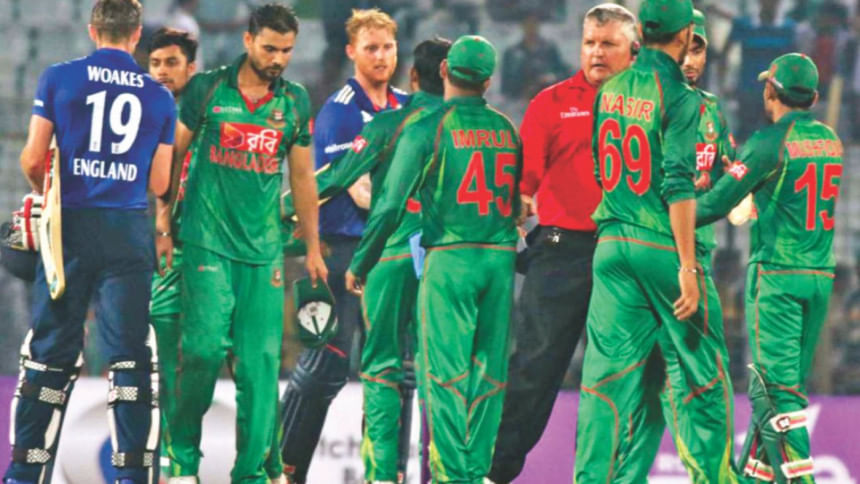Pickings on road to cricketing powerhouse

After six consecut ive series wins against world class cricketing sides and 11months of hibernation, the stage was set for three ODIs against an improving Afghan side, an associate member of the ICC. The latter played reasonably well against us but we did outclass them in the last match of the series.
That was a befitting warmer to the ODI series in Bangladesh against a formidable younger English side led by Jos Buttler. This has been a hard-fought series of sharply fluctuating fortunes, at times making the matches look as if these could go either way. Even the tight results—England winning the first ODI by 21 runs, Bangladesh leveling off with a 34-run victory in the second and England clinching the decider by four wickets—could not have fully depicted the fiercely competitive nature of the contests.
The series winning four -wicket victory by England involved a spell over which the equation closed in on 81 runs for 81 balls. At that stage, Imrul Kayes who had been thought fully positioned at slip to the bowling off Taskin dropped a regulation catch. If held, it would have proved quite a turning point in the match. In the first ODI two catches were dropped off Taskin's bowling. You could almost feel the truth of the statement that catches win matches.
One cannot but point out the poor fielding of the Bangladesh side in the first ODI; we saw hardly any neat picking of the balls. It was for the most part sloppy, even clumsy. Since the first ODI though fielding improved to a great extent.
There were some outstanding features of Bangladesh's innings in the last ODI. These include the best opening partnership between Tamim and Kayes and the highest seventh wicket partnership of any Bangladesh side in one-day internationals. As the series progressed our batters who had initially struggled with short balls, started coping with them better. They would show awareness of where the fielders were and found gaps to score runs through.
Not to mention Bangladesh losing all the three tosses, which for England were good strokes of luck barring the second ODI where captain Mashraffe Murtaza's stellar performance with bat and ball gave Bangladesh the leveler win.
In particular, losing the third toss to England proved consequential. Bangladesh was put to bat on a rain-soaked slower pitch and outfield. From that standpoint, Bangladesh's score of 277 looked impressive. Yet with a faster outfield the flow of runs tally could be better. By contrast, in a drying pitch and outfield after Bangladesh's innings England could bat with relative ease.
On the other hand, as the dusk fell, dew factor came into play with our bowlers having difficulty gripping the ball. Former English captain, now a commentator Nasir Hossain termed the dew a 'real hindrance.'
Pacer Shafiul gave a crucial breakthrough by ensuring the fall of third wicket at 172 in the decider ODI. It was a potential turning point as the English batters right through the fall of three more wickets subsequently held their ground keeping the score board ticking to bridge the gap with the required run rate.
Some English commentators termed the encounters "a thrilling series"; an even contest between bat and ball' (Nasir Hossain); and Bangladesh being "a difficult team to beat." "They were no longer the pushovers of past tours here," added English vice-captain Ben Strokes.
With the series leveler promising a dramatic climax at the decider round in Chittagong, and an atmosphere of tension prevailing, there has been an issue touching on sportsmanship.
A post-2nd ODI report in The Telegraph had the following story line: England lose as Jos Buttler and Ben Stokes have heated words with hosts.
To a question as to why the English captain lost his cool, his reported reply was, "Mainly just the way they celebrated by running towards me and giving me a bit of a send-off."
The ICC match referee Jagaval Shrinath having reportedly fined Mashrafe Mortuza and his teammate Sabbir Rahman 20 percent of their match fee and officially reprimanded Buttler, the matter was left behind.
Mashrafe took a dignified stance when an English reporter was supposed to have suggested whether Bangladesh captain would apologise. Mashrafe ruled that out, saying they did no wrong as they were just celebrating a win.
Such things have happened in the highly combative world of cricket. Here is an anecdote among a plentiful of them, some very nasty in tone and temper, relating to the Ashes series and Indo-Pak encounters: Indian skipper Sourav Ganguly famously brandished his jersey at Lord's balcony when India beat England in a memorable Natwest Trophy Final in 2002.
Ganguly's celebration was a retort to Andrew Flintoff's shirt-waving celebration after winning an ODI match in India helping England to tie the six match series 3-3.
The ICC and members and national sides should know where to draw the line between enthusiasm and unsportsmanlike behaviour for the good of world cricket. For our part the crowds may occasionally applaud good performance by English players to make them feel more welcome and that we can appreciate good cricket.
The writer is a contributor of The Daily Star. [email protected]

 For all latest news, follow The Daily Star's Google News channel.
For all latest news, follow The Daily Star's Google News channel. 




Comments